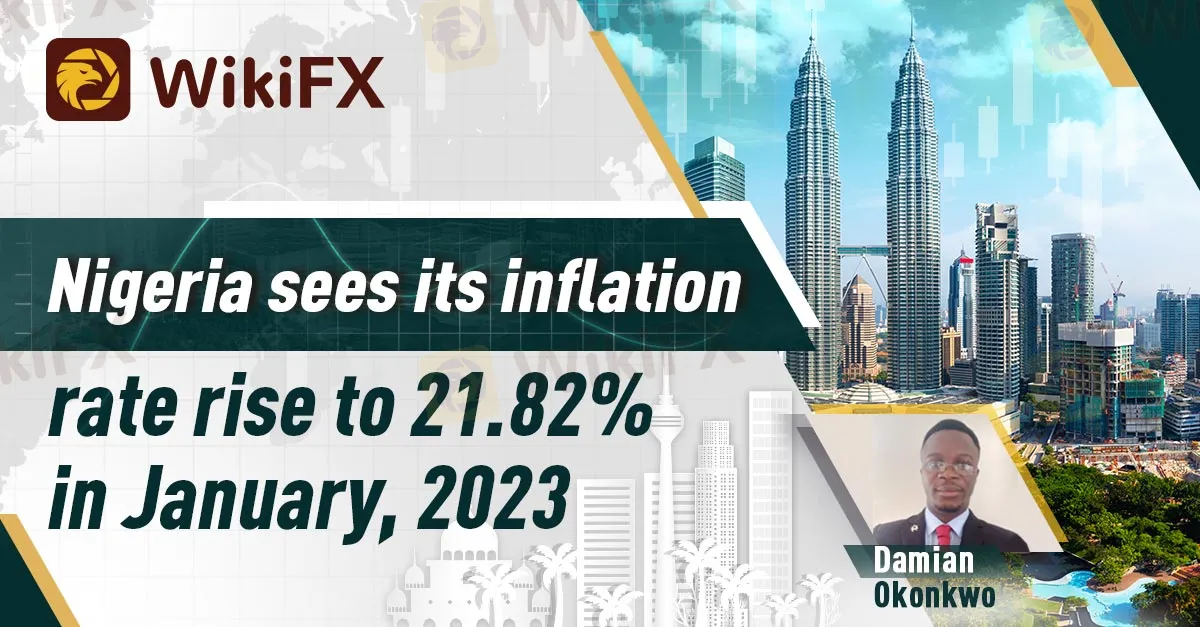简体中文
繁體中文
English
Pусский
日本語
ภาษาไทย
Tiếng Việt
Bahasa Indonesia
Español
हिन्दी
Filippiiniläinen
Français
Deutsch
Português
Türkçe
한국어
العربية
Nigeria sees its inflation rate rise to 21.82% in January, 2023
Abstract:The Nigerian inflation rate rose to 21.82% in January 2023, marking its highest level in over a decade.

By: Damian Okonkwo

Nigeria's inflation rate has surged to a new high of 21.82% in January 2023. According to the report, which was released by the National Bureau of Statistics (NBS) on Tuesday, the inflation rate in Nigeria increased by 0.99% in January 2023, compared to the 20.83% recorded in December 2022.
The current high rise in inflation is said to have been driven by the naira scarcity, which has caused prices of goods and services to skyrocket across the country.
This marks one of the highest inflation rate Nigeria has seen in over a decade, with the last time inflation was this high being in 2005 when it hit 28.2%. The latest figure shows an increase from the 20.75% recorded in December 2022.
Some economists also blamed the rise in inflation to be largely caused by the country's struggling economy and the fall in the value of the naira. Nigeria has been grappling with an economic crisis due to declining oil prices, which account for the majority of the country's revenue, and the impact of the COVID-19 pandemic.
The naira has been under pressure, with the currency losing value against the US dollar in recent months. This has led to an increase in the cost of imports, which has contributed to the rising inflation rate.
According to the NBS report, the food inflation index increased to 24.32% in January 2023 from 23.75% in December 2022. This suggests that the rising cost of food items is contributing significantly to the high inflation rate.
The report also shows that the core inflation rate, which excludes the prices of volatile agricultural produce, increased to 19.16% in January 2023 from 18.49% in December 2022.
The Nigerian government has been implementing various measures to address the country's economic challenges, including a recent decision to remove fuel subsidies and raise electricity tariffs.
However, these measures have also contributed to the rising cost of living in Nigeria, as fuel and electricity prices have increased significantly in recent months.
In response to the latest inflation figures, economists have called on the government to implement more effective policies to address the root causes of inflation, particularly naira scarcity. They have also urged the CBN to review its foreign exchange policies and take more decisive action to stabilize the currency and the economy.
Experts have further warned that the high inflation rate could have a detrimental effect on the country's economy and lead to further social unrest.
As Nigeria continues to navigate its economic challenges, it remains to be seen what measures will be taken to address the rising inflation rate and help alleviate the impact on citizens' lives.

Disclaimer:
The views in this article only represent the author's personal views, and do not constitute investment advice on this platform. This platform does not guarantee the accuracy, completeness and timeliness of the information in the article, and will not be liable for any loss caused by the use of or reliance on the information in the article.
Read more

The Ultimate Guide to Automated Forex Trading in 2025
Modern markets are revolutionized by automated trading systems, which now execute 70-85% of all transactions. These advanced automated trading software solutions, commonly called trading robots or Expert Advisors (EAs), leverage algorithmic precision for automatic trading across forex, stocks, and commodities 24/7. By removing emotional interference and executing trades in microseconds, auto forex trading platforms create fair opportunities for all market participants. For those new to automated trading for beginners, these systems provide disciplined, backtested strategies while significantly reducing manual effort.

Will natural disasters have an impact on the forex market?
The forex market is known for its rapid responses to global events, but the influence of natural disasters, such as earthquakes and typhoons, can be less straightforward. While headlines may scream about catastrophic damage and economic disruption, the long-term effects on currency values often depend on a blend of immediate shock and underlying economic fundamentals.

Why does your mood hinder you from getting the maximum return from an investment?
Investment decisions are rarely made in a vacuum. Aside from the objective data and market trends, our emotions—and our overall mood—play a crucial role in shaping our financial outcomes. Whether you’re feeling overconfident after a win or anxious after a loss, these emotional states can skew your decision-making process, ultimately affecting your investment returns.

How Reliable Are AI Forex Trading Signals From Regulated Brokers?
Discover how reliable AI Forex trading signals are and why using a regulated broker boosts their effectiveness. Learn key factors to evaluate accuracy and enhance your trading.
WikiFX Broker
Latest News
How Crypto Trading Transforms FX and CFD Brokerage Industry
FCA Warns Against 10 Unlicensed or Clone Firms
CySEC Warns Against 14 Unlicensed Investment Websites
Top Currency Pairs to Watch for Profit This Week - March 31, 2025
Will natural disasters have an impact on the forex market?
Philippines Deports 29 Indonesians Linked to Online Scam Syndicate in Manila
Exposed: Deceptive World of Fake Trading Gurus – Don’t Get Fooled!
AI-Powered Strategies to Improve Profits in Forex Trading
Stock Market Trading Volume Drops by 97.58 Billion Naira This Month
Why does your mood hinder you from getting the maximum return from an investment?
Currency Calculator







